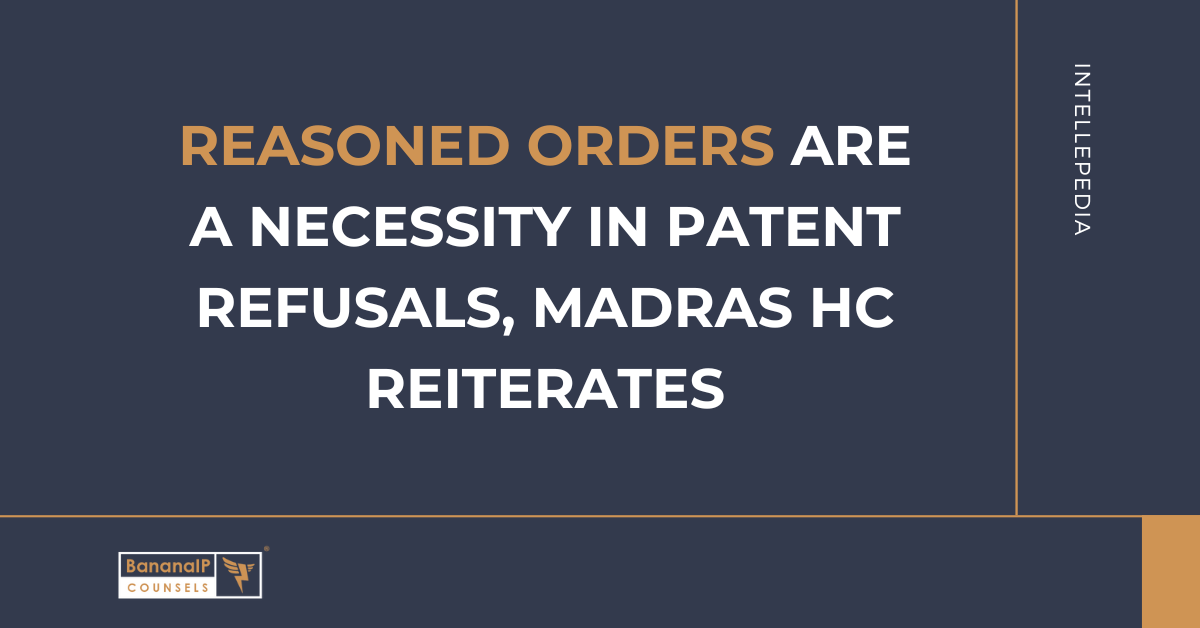Delhi HC affirms rejection of a patent on ZLD process from distillery waste, citing lack of inventive step and application of Section 3(d) of the Patents Act.
Read more about Old Wine in New Bottle: Distillery Waste Patent DeniedTag: Section 3(d)
Amgen’s Lyophilized Peptibody Patent Upheld by Madras High Court
Madras High Court backs Amgen on lyophilized peptibody formulations, rejecting Section 3(d), 3(e) and inventive step objections. Grant directed, with claims narrowed to supported sequences.
Read more about Amgen’s Lyophilized Peptibody Patent Upheld by Madras High CourtAnti-Cancer Patent Refusal Set Aside for Not Identifying ‘Known Substance’
In a recent ruling, the Delhi High Court overturned the rejection of an anti-cancer patent filed by Taiho Pharmaceutical. The Court highlighted that objections under Section 3(d) must explicitly state the “known substance” being referenced and directed a fresh hearing for proper assessment.
Read more about Anti-Cancer Patent Refusal Set Aside for Not Identifying ‘Known Substance’When Delay Becomes Denial: Calcutta High Court Overturns Patent Rejection
The recent judgement of the Calcutta High Court in BASF SE v. Joint Controller of Patents warrants attention for multiple reasons, particularly as it addresses...
Read more about When Delay Becomes Denial: Calcutta High Court Overturns Patent RejectionReasoned orders are a necessity in patent refusals, Madras HC reiterates
 Featured image for article: Reasoned orders are a necessity in patent refusals, Madras HC reiterates
Featured image for article: Reasoned orders are a necessity in patent refusals, Madras HC reiterates
The Madras High Court overturned a patent refusal in Signal Pharmaceuticals vs. Deputy Controller of Patents, citing a lack of reasoning in the rejection order. The Court observed that the Patent Office failed to address the applicant’s arguments, disregarded amended claims, and provided no justification for the refusal under Section 2(1)(ja) and Section 3(d) of the Patents Act. The case was remanded for reconsideration, reinforcing the necessity of well-reasoned patent orders.
Read more about Reasoned orders are a necessity in patent refusals, Madras HC reiteratesMadras High Court Overturns Patent Refusal under section 3(d), Reiterates Importance of Reasoned Orders and Natural Justice
The Madras High Court set aside a patent refusal under section 3d, citing lack of procedural fairness and insufficient reasoning. The Court directed reconsideration, underscoring the necessity of reasoned orders and respect for principles of natural justice in patent proceedings.
Read more about Madras High Court Overturns Patent Refusal under section 3(d), Reiterates Importance of Reasoned Orders and Natural JusticeA doped order on method of doping, court clarifies
The Madras High Court upheld the Patent Office’s refusal of IIT Madras’s patent application for a method of doping potassium into ammonium perchlorate. The judgment clarifies the application of Section 3d and inventive step requirements in Indian patent law.
Read more about A doped order on method of doping, court clarifiesVictory for Novozymes: Madras High Court Overrules Patent Office’s Refusal
The Madras High Court has reversed the Patent Office’s rejection of Novozymes’ patent for enzyme granules in animal feed, emphasizing the need for detailed reasoning in refusal orders. The decision clarifies the application of inventive step and Section 3d in Indian patent law.
Read more about Victory for Novozymes: Madras High Court Overrules Patent Office’s RefusalCancerous Battle: Novartis and NATCO clash over Eltrombopag
The Delhi High Court Division Bench set aside an injunction against Natco Pharma in the Novartis Eltrombopag patent dispute. The judgment provides key guidance on patent validity challenges and the requirements under Section 3(d) of the Patents Act in pharmaceutical cases.
Read more about Cancerous Battle: Novartis and NATCO clash over EltrombopagReview and Reversal of Patent Refusal Orders by the Madras High Court
The Madras High Court has set aside several patent refusal orders, highlighting the need for proper reasoning and adherence to legal procedures. These judgments clarify essential aspects of patentability assessment and reinforce procedural fairness in Indian patent law.
Read more about Review and Reversal of Patent Refusal Orders by the Madras High Court


